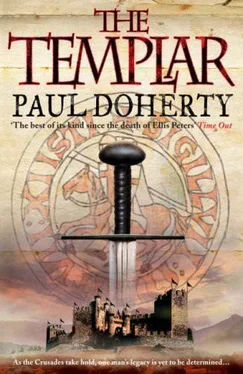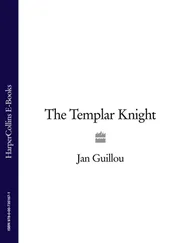P. Doherty - The Templar
Здесь есть возможность читать онлайн «P. Doherty - The Templar» весь текст электронной книги совершенно бесплатно (целиком полную версию без сокращений). В некоторых случаях можно слушать аудио, скачать через торрент в формате fb2 и присутствует краткое содержание. Год выпуска: 2010, ISBN: 2010, Издательство: Minotaur Books, Жанр: Исторические приключения, на английском языке. Описание произведения, (предисловие) а так же отзывы посетителей доступны на портале библиотеки ЛибКат.
- Название:The Templar
- Автор:
- Издательство:Minotaur Books
- Жанр:
- Год:2010
- ISBN:9780312576837
- Рейтинг книги:5 / 5. Голосов: 1
-
Избранное:Добавить в избранное
- Отзывы:
-
Ваша оценка:
- 100
- 1
- 2
- 3
- 4
- 5
The Templar: краткое содержание, описание и аннотация
Предлагаем к чтению аннотацию, описание, краткое содержание или предисловие (зависит от того, что написал сам автор книги «The Templar»). Если вы не нашли необходимую информацию о книге — напишите в комментариях, мы постараемся отыскать её.
The Templar — читать онлайн бесплатно полную книгу (весь текст) целиком
Ниже представлен текст книги, разбитый по страницам. Система сохранения места последней прочитанной страницы, позволяет с удобством читать онлайн бесплатно книгу «The Templar», без необходимости каждый раз заново искать на чём Вы остановились. Поставьте закладку, и сможете в любой момент перейти на страницу, на которой закончили чтение.
Интервал:
Закладка:
The Army of God continued its march, beginning its climb through the mountains leading down to the plains of Syria and the city of Antioch. As Peter Bartholomew so eloquently proclaimed: their ascent was, in fact, more of a descent into a cruel hell of tortuous shale-strewn trackways lined with dark, sombre forests, along ledges that turned treacherous underfoot, especially when the autumn rains set. Little wonder Hugh and Godefroi called them ‘the Mountains of the Devil’ or ‘the Mountains of Hell’. Now and again they found some respite in one of the scattered stone-walled villages with their brown-domed churches and flat-topped, mud-brick cottages with cow and goat pens hidden behind. At least the inhabitants did not flee. Squat, sallow-faced men, garbed in old armour and reeking of cattle, dried milk and dung, came out to greet them. They carried crosses and offered wine and stale bread, explaining how they were Armenian Christians, hostile to the Turks. When Eleanor, Hugh and other leaders of the Poor Brethren met them in the dusty porchways of their round churches, they found the Armenians equally wary of the Franks. In truth, they offered little help and stole whatever they could. They also relayed false information, telling them that Antioch was an open city where the Turks were preparing to flee. Count Raymond, recovering from a near-fatal illness, believed them and immediately dispatched a conroy of five hundred knights, but the news proved false. On one subject the Armenians were adamant: the way ahead was bleak and treacherous. And so it proved.
The Army of God climbed across a landscape of plunging gorges, narrow winding tracks, twisting paths, icy air, biting winds and mist as thick as vapour from a steaming pot. Men, horses and pack ponies missed their footing or were too weary to be wary and slipped into the yawning darkness below. Knights found armour and harness a great burden and offered to sell them for a few coins; when they found no buyers, they cast their heavy loads into the chasm. Nights were long and cold. Sometimes it was impossible to kindle fires as they perched on ledges and trackways under brooding cliffs. Bishop Adhémar kept their spirits up by insisting that they intone the Ave Maria, whilst Hugh continued to lead the Poor Brethren in their own devotional hours. Eleanor found it difficult to reflect. She could only concentrate on each day as it came, plodding through that grim, horrid place listening to Simeon the Scribe whisper how they would soon be out of the Mountains of Hell. Eventually they were. Early one morning they breasted the peaks and began their descent into green-carpeted valleys, down through soft meadowland and fields where barley, wheat and millet had been freshly harvested. Simeon pointed out the various trees: sycamore and oak, laurel, terebinth and palm. They feasted on the soft, plump fruit of olive trees with their knotted trunks, shiny green bark and lance-like leaves. They collected the fruit of fig, almond, apple, apricot and pear. They wondered at the purple pomegranate and plucked at carob trees for their medicinal use while gazing hungrily at the fat-tailed sheep browsing in the grasslands and the occasional black-nosed gazelle that sped hastily across their path.
Eleanor felt as if she had been reborn as Simeon described the great variety of birds: shrikes, goldfinches with rose-coloured breasts, cranes and white storks. They slaked their thirst at pools where river warblers sang, and in the grassy fringes, crickets and grasshoppers chanted their monotonous hymn to the sun. Food and other supplies became plentiful through barter or foraging. No Turkish forces appeared; news of the defeat at Dorylaeum had spread on the wind. The only threats were the scattered garrisons locked up in their hilltop fortresses. According to scouts, the way to Antioch lay open. The Poor Brethren, like the rest of the Army of God, relaxed. They camped in the meadowlands enjoying the sun, filling their bellies and, as Peter Bartholomew declared, shaking off the dust from the devil’s mountains. A census was taken. The wounded were moved to be tended by leeches and priests. Animals were let out to graze. Clothes were stitched, darned, washed and stretched out to dry. Armour was cleaned with sand, weapons were sharpened, harness, carts, baskets and panniers repaired. Eleanor bathed, washed and mended what she could and seized any hour for rest and sleep. The journey from Constantinople had changed her. She was now less certain about everything; more concerned about those around her than reaching Jerusalem. She put this down to exhaustion, yet there was something else. It was as if all her old certainties had been shaken. Such quiet reflection soon ended. Eleanor became alarmed at disquieting rumours about Antioch. How the city was heavily fortified, so impregnable its inhabitants openly boasted that it could only be taken by treachery, surprise or starvation.
‘The latter is out of the question,’ Hugh announced at one of their meetings. They sat under the spreading branches of an old oak tree sharing a wineskin and a dish of fruit. They revelled in the warmth of the autumn sun, their nostrils tickled by the sweet scent from the nearby orchards mingling with the fragrance of wild flowers.
‘Why?’ Peter Bartholomew asked.
‘We have no siege weapons,’ Hugh replied, ‘and it would take weeks to hew wood, fashion planks and construct engines of war. We have lost engineers and masons. The Emperor Alexius is a hundred miles away, unable to help us. Antioch is our real challenge. Let me explain.’ He snapped his fingers. Simeon produced a scroll of parchment and unrolled it. They gathered closer to study this finely drawn chart of Antioch.
‘The first line of defence,’ Hugh explained, ‘is the river Orontes, which cuts across the plain of Antioch. Beyond that, the great wall of the city rises at least thirty-two feet high. This wall is so thick, one of our great carts could be rolled along its ramparts with horsemen riding on either side.’ He stilled the rising clamour. ‘It runs two miles along the Orontes, then on either side it climbs to encircle the city as well as contain three great hills. On the highest of these stands a towering citadel that dominates everything. When we march there we will leave the foothills and occupy the northern plain. Looking across it, we will see the river, a stretch of land, the great ditch and then the might of Antioch. We will have to camp in front of the city. The flanks and rear of Antioch are protected not only by that wall but also by the sheer height of the three hills. On the flanks and rear stand no gates; only small postern doors served by narrow trackways. It would be impossible to camp there. The ascent itself would be very, very dangerous and easily detected by guards on the wall or the citadel.’ Hugh paused. ‘Think of climbing the cliffs we have recently crossed, then having to scale a wall, whilst we can only camp on a ledge so narrow, only a few men at a time could assemble there.’
‘So our attack,’ Imogene asked fearfully, ‘must come from the front?’
‘Yes, and again there are great difficulties.’ Theodore pointed to the chart Simeon still held between his fingers. ‘The curtain wall is very thick. The city has many gardens and fruit orchards, whilst a stream runs down from those three hills through a watergate on to the plain.’ He wagged a finger. ‘Remember that! Antioch is furnished with enough water and produce to withstand a siege for a while. Moreover, that wall is so long and so massive, we simply do not have the siege equipment to break, shatter or undermine it.’
‘What about gates?’ Beltran asked.
‘Five in all,’ Theodore declared, ‘along the great wall facing the plain. All of these are flanked and protected by massive square towers rising sixty feet into the sky. From these towers the gates, as well as all approaches to them, can easily be protected.’ Theodore paused at the groans of his companions.
Читать дальшеИнтервал:
Закладка:
Похожие книги на «The Templar»
Представляем Вашему вниманию похожие книги на «The Templar» списком для выбора. Мы отобрали схожую по названию и смыслу литературу в надежде предоставить читателям больше вариантов отыскать новые, интересные, ещё непрочитанные произведения.
Обсуждение, отзывы о книге «The Templar» и просто собственные мнения читателей. Оставьте ваши комментарии, напишите, что Вы думаете о произведении, его смысле или главных героях. Укажите что конкретно понравилось, а что нет, и почему Вы так считаете.












